|

While
I was ranting and raving about a 100
Greatest Horror Movies list, I referred to Suspiria and Cemetery
Man as "middling horror movies", which gained me the ire
of sometimes correspondent and recent Italian movie convert Marc Beschler. We both, I think, had good points, and I found I had come
away able to approach Lucio Fulci's The Gates of Hell with a
fresher viewpoint than I might have managed otherwise - thanks, Marc (it also got him to write a review for the movie Autopsy, so I'll put that particular Evil Plan in the "Successful" folder).
By
and large I still feel Italian horror cinema typifies Sturgeon's Law
quite nicely. Theodore Sturgeon was a fine (and deeply missed) writer
who once posited 95% of everything is crap.
Depending on your pessimism that day, the number can go as high as 98%.
Oh, yes, the same Law holds for American cinema too, but in Italian
movies, the demarcation is so much starker. For so long, most
of the Roman movies we got for domestic consumption was mere imitative
drek, which tends to drown out the better stuff that might come our
way.
For
instance, on that self-same list, the only Fulci film is Zombie,
which is simply Dawn of the Dead by way of the previous year's
Dr. Butcher, M.D., only without the humor or social commentary
of the Romero film (It's common knowledge, but here we go anyway: DotD
was a big hit in Italy, where it was called Zombie. What we know
as Zombie here in the US was actually titled Zombie 2.
Got that? Next time, we'll go into the The Big Boss/Fist of Fury
re-titling). Why this was chosen over the more imaginative (but still
problematic) Gates of Hell or the recently re-released The
Beyond aka Seven Doors of Death remains quite beyond me.
We
are informed that the movie begins in Dunwich (hmmmm....) where a priest,
Father Thomas, 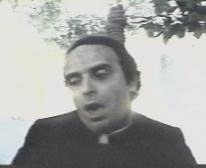 retires
to a local graveyard to hang himself. Meanwhile, in New York, Mary the
Medium (Catriona MacColl) has a vision of the suicide, shrieks "The
living dead!" and falls to floor, an apparent victim of death by
fright. retires
to a local graveyard to hang himself. Meanwhile, in New York, Mary the
Medium (Catriona MacColl) has a vision of the suicide, shrieks "The
living dead!" and falls to floor, an apparent victim of death by
fright.
Enter
Peter (Christopher George), possibly the world's least effective reporter.
Peter gets turned away by cops at Mary's apartment, then shows up at
the cemetery long after the funeral,  when
there's nobody around to interview. This does, however, put him in the
right place at the right time when Mary wakes up inside her sealed
coffin. Hearing her screams, Peter grabs a nearby pickaxe and ventilates
the coffin (and nearly her head, several times), saving her from suffocation
(and a damned lucky thing they don't embalm in New York, eh?). when
there's nobody around to interview. This does, however, put him in the
right place at the right time when Mary wakes up inside her sealed
coffin. Hearing her screams, Peter grabs a nearby pickaxe and ventilates
the coffin (and nearly her head, several times), saving her from suffocation
(and a damned lucky thing they don't embalm in New York, eh?).
Later,
at Mary's apartment, Peter hears about Mary's vision and learns our
plot - The suicide of Father Thomas has opened up the Gates of Hell,
and if they are not closed by All Saints Day ("next Monday!!!!")
then the dead will walk, Hell will reign over Earth, and Vanilla Ice
will stage a comeback. Armed with this knowledge, Peter and Mary swing
into action, piling into his car to seek out Dunwich, a place that "isn't
even on the map".
Meantime,
things are getting weird in Dunwich, a town which we are told is peopled
by descendants of the "Salem witch burners" (we are also told
later that Dunwich is built on the ruins of Salem, which must have been
a shock to the good people of Salem, Massachusetts). Mirrors shatter
for no reason, walls crack and bleed, and a constant windstorm buffets
the town. The local problem kid, Bob (Giovanni Radice) breaks into an
abandoned house and finds, to his delight, a self-inflating love doll.
To his less-than-delight, he also finds a badly decomposed corpse. True
to form, Fulci gives us a long, loving closeup of the body, the camera
panning down the worm-infested landscape.
There
are a goodly number of worms in The Gates of Hell. The most remarkable
thing about them is that they are the noisiest worms ever placed on
film... and I was completely unaware that worms made any sound at all,
lacking such niceties as lungs, and that sort of thing. But we never
see any invertebrates onscreen without an accompanying odd, squeaking,
slurping sound.
Although
Dunwich is too small to appear on any map, it still possesses a psychiatrist,
Jerry (Carlos de Mejo), who has at least one patient, Sandra (Janet
Agren). After her introduction, 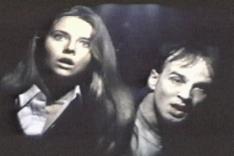 though,
we follow Emily, who is Jerry's assistant or main squeeze or something,
and who is also trying to play social worker to the disturbed Bob. When
she tracks down Bob at a deserted gas station however, a bestial snarling
freaks out the already strung-out Bob, and he bolts, leaving Emily behind.
An all-too-ambulatory Father Thomas appears, shoving a handful of slimy
dirt mixed with squeaky worms in her face. though,
we follow Emily, who is Jerry's assistant or main squeeze or something,
and who is also trying to play social worker to the disturbed Bob. When
she tracks down Bob at a deserted gas station however, a bestial snarling
freaks out the already strung-out Bob, and he bolts, leaving Emily behind.
An all-too-ambulatory Father Thomas appears, shoving a handful of slimy
dirt mixed with squeaky worms in her face.
Meanwhile...
which is the way things tend to happen in horror movies... there is
a... (wait for it!) couple out parking in the windstorm. BAD MOVE.
Father Thomas shows up. The guy tries to start 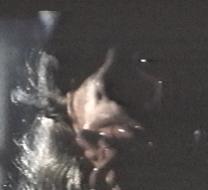 his
Jeep, but (wait for it!) the car won't start! Fr. Thomas locks
eyes with the girl, and, in the movie's most infamous scene, she starts
bleeding from the eyes and then pukes up her guts... quite literally.
Boyfriend is predictably horrified, but the door handles prove to be
just as useless as the ignition. Then his girlfriend yanks his brain
out the back of his head. Ouch. his
Jeep, but (wait for it!) the car won't start! Fr. Thomas locks
eyes with the girl, and, in the movie's most infamous scene, she starts
bleeding from the eyes and then pukes up her guts... quite literally.
Boyfriend is predictably horrified, but the door handles prove to be
just as useless as the ignition. Then his girlfriend yanks his brain
out the back of his head. Ouch.
Let
us pause here to mention that the Boyfriend is played by none other
than Michele Soavi, who would recover from his brain-ectomy to make
some pretty good horror films of his own. I have no idea who the girl
was, which is a real pity. She deserves extra props for putting all
that crap in her mouth until they could cut to the dummy head.
Now,
Bob is blamed for the rash of deaths and disappearances (although the
official verdict is that Emily died of fright), with the eventual result
of Bob crossing paths with an angry, drunken father who introduces Bob's
head forcibly to a huge drill. This is the movie's second most
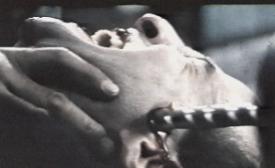 infamous
scene, aping the notorious huge-splinter- in-the-eyeball scene from
Zombie. It takes a full, struggling, grunting minute to play
out, causing the moviegoer to think, nah, they're not gonna do it.
They never stretch things out this long and do it. Something's gonna
make him stop. They'll never do it. Then they do it: the drill bites
into flesh and eventually comes out the other side of Bob's head. Although
the mechanics of how the effect was achieved are fairly transparent,
it's still quite realistic and unnerving. infamous
scene, aping the notorious huge-splinter- in-the-eyeball scene from
Zombie. It takes a full, struggling, grunting minute to play
out, causing the moviegoer to think, nah, they're not gonna do it.
They never stretch things out this long and do it. Something's gonna
make him stop. They'll never do it. Then they do it: the drill bites
into flesh and eventually comes out the other side of Bob's head. Although
the mechanics of how the effect was achieved are fairly transparent,
it's still quite realistic and unnerving.
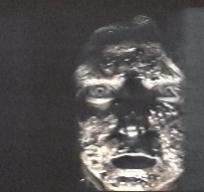 And
where are Peter and Mary during all this, you may ask? Wandering around
lost, until a helpful priest in a nearby community points them in the
right direction. Meanwhile (there's that word again), dead bodies have
been disappearing from the funeral parlor (after chewing up the hand
of a thieving attendant) and doing anti-social things like peering in
windows and cropping up suddenly in Sandra's kitchen (only to vanish
when Jerry and Sandra turn their backs). These events conspire to place
Jerry, Peter and Mary in the graveyard at the same time. And
where are Peter and Mary during all this, you may ask? Wandering around
lost, until a helpful priest in a nearby community points them in the
right direction. Meanwhile (there's that word again), dead bodies have
been disappearing from the funeral parlor (after chewing up the hand
of a thieving attendant) and doing anti-social things like peering in
windows and cropping up suddenly in Sandra's kitchen (only to vanish
when Jerry and Sandra turn their backs). These events conspire to place
Jerry, Peter and Mary in the graveyard at the same time.
Now,
although they only have until midnight to find Fr. Thomas' grave and
kill him again, everyone retires to Jerry's house for a nice cup of
tea and exposition. Just as they are about to decide what to do, the
windstorm bursts open the living room window and sprays a rain of maggots
into the room (Suspiria flashback, anyone?). They are, needless
to say, squeaking maggots, and Sandra provides us with the mandatory
Italian horror movie scene of a person vomiting. The phone rings, and
Jerry brushes off enough maggots to answer it. On the other end is Emily's
kid brother, who tells him that Emily just showed up and slaughtered
his parents.
Thus
begins a series of sidetrips that further delay our heroes. Sandra is
sent home with the orphaned kid brother to protect, but the wily undead
Emily has gotten there first, and yanks Sandra's brain out the back
of her head. Kid bro is entrusted to the cops, and Peter, Mary and Jerry
finally make it back to the graveyard - at midnight.
Unfortunately,
after this point, Gates of Hell becomes simply another zombie
attack movie, as 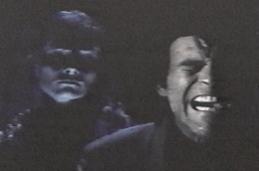 the
dead pop up and do away with most of the surviving denizens of Dunwich...
off camera. Our heroes break into the Thomas family crypt and find a
tunnel behind Thomas' empty chamber. A zombie Sandra shows up and pulls
Peter's brain out the back of his etc. (and I thought it was jokes
that are supposed to be repeated three times), and Jerry finds that
a wooden stake through the belly will put a zombie down. Not the heart,
the belly. Make of that what you will. the
dead pop up and do away with most of the surviving denizens of Dunwich...
off camera. Our heroes break into the Thomas family crypt and find a
tunnel behind Thomas' empty chamber. A zombie Sandra shows up and pulls
Peter's brain out the back of his etc. (and I thought it was jokes
that are supposed to be repeated three times), and Jerry finds that
a wooden stake through the belly will put a zombie down. Not the heart,
the belly. Make of that what you will.
Peter
and Mary continue down the tunnel, finally coming to what might
be the Gate of Hell, except that it's not open. A bunch of zombie monks
creep up behind them in a far-too-dark-to-be-effective scene, and Fr.
Thomas finally shows back up, trying to do the regurgitate-your-entrails
bit with Mary. Jerry snatches a large cross from one of the zombie monks
and stabs Thomas with it (in the belly, natch), causing the undead clergyman
and his Blind Dead wannabes to burst into flames. The end.
Or,
it should be. There's an annoying non-ending that absolutely defies
my ability to render it into words. Suffice to say that it is dreary, stupid, and looks like it was
tacked on purely as an afterthought, sometime in the post-production
stage, accomplished as it is with sound and cheap animation.
words. Suffice to say that it is dreary, stupid, and looks like it was
tacked on purely as an afterthought, sometime in the post-production
stage, accomplished as it is with sound and cheap animation.
One
of my major criticisms of Italian horror cinema is that too often they
seem made up of major setpieces linked together by the weakest of plots,
as if somebody said, "Hm, I'd like to do a movie where a girl pukes
up her guts. How do we set that up?" "How about the old 'gates
of hell are open' gambit?" "Sure, that'll work." The
difference here, I think, is that the disjointed, chaotic nature of
the setpieces actually enhances the plot... such as it is. The
best thing about Italian horror cinema is that anybody is fair
game. In an American movie, Weird Bob would be rescued from the drill
and probably do something heroic towards the end of the movie. Not here.
And they killed the token American, for pete's sake. It doesn't
make you feel safe.
There
are still major hurdles to cross, and not just historical inaccuracies,
like the bogus destruction of Salem, and the fact that no witches
were burned there (they were all hanged, except for one, who was pressed
to death): Just what the hell is the relationship between Jerry
and the doomed Emily? And between Jerry and Sandra, for that matter?
If the end of the world is only hours away, why does Mary pout coquettishly
that she wants to stop for a while and get something to eat (get a burger
to go, for God's sake, woman!)? Why is everyone so lackadaisical
about preventing the end of the world? Why are the Gates of Hell
so damned easy to open? And what the hell is that crap ending?
(some answers have come my way since this review was first published; the negative of the original ending - the kid is really a zombie, which come to think of it, ain't that great an improvement - was destroyed in the lab. Out of money, Fulci went for the weird ending we all know and... um, love, as it were)
The
makeup is fairly good - you only see obvious latex in a couple of instances.
This has the reputation of being one of Fulci's goriest movies, but
the gut-puking, zombie's-signature-yank-your- brain-out-the-back-of-your-head
move, and drill through the head excluded, Gates of Hell is surprisingly
clear of extreme gore effects (though, to some tastes, those instances
are certainly enough). Then again, Peter Jackson has very effectively
raised the bar for me on what constitutes gratuitous, over-the-top gore.
Instead,
a lot of Gates of Hell's fear factor comes from a very creative
use of sound and light. The movie begins with a black screen - a woman's
scream pierces the silence, and the titles begin. I've already mentioned
the noisy worms, but the bestial and gibbering sounds associated with
the walking dead are original and quite unnerving. Like most movies
of the period, Gates includes a 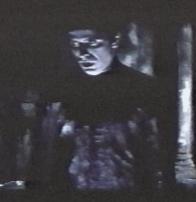 Goblin-esque
musical score, which, while effective, only underlines the derivative
quality of the final act. Fulci also knows the value of putting a light
directly under an actor's face, like the flashlight under the chin of
a good storyteller at a campfire; it renders what was probably mediocre
makeup into something truly horrifying. Some of the makeup, especially
in the case of Weird Bob, seems designed and applied with a large proscenium
stage in mind, rather than a movie. Goblin-esque
musical score, which, while effective, only underlines the derivative
quality of the final act. Fulci also knows the value of putting a light
directly under an actor's face, like the flashlight under the chin of
a good storyteller at a campfire; it renders what was probably mediocre
makeup into something truly horrifying. Some of the makeup, especially
in the case of Weird Bob, seems designed and applied with a large proscenium
stage in mind, rather than a movie.
Gates
is one of those movies that bemuses me somewhat, because I discover,
upon a repeat viewing, that it was actually better than I remembered,
instead of the other way around. The only other movie that's managed
to pull that off is Enter the Dragon (two
Bruce Lee references in one review? Must be time to review a kung fu
film). Neither is representative of the best their country or their
genre has to offer; and while neither is necessarily a great
movie, they're both entertaining in that mindless, reach-into-your-reptile-brain-and-tickle
sort of way.
|